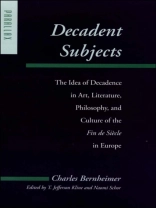An illuminating exploration of fin de siècle decadence “by a well-known authority in the areas of European literature, culture, and psychoanalysis” (Pre-Raphaelite Studies).
The influential writer and scholar Charles Bernheimer described decadence as a “stimulant that bends thought out of shape, deforming traditional conceptual molds.” In this posthumously published work, Bernheimer succeeds in making a critical concept out of this perennially fashionable, rarely understood term.
This remarkable collection of essays shows the contradictions of the phenomenon, which is both a condition and a state of mind. In seeking to show why people have failed to give a satisfactory account of the term decadence, Bernheimer argues that we often mistakenly take decadence to represent something concrete, that we see as some sort of agent. His salutary response is to return to those authors and artists whose work constitutes the topos of decadence, rereading key late nineteenth-century authors such as Nietzsche, Zola, Hardy, Wilde, Moreau, and Freud to rediscover the very dynamics of the decadent.
Through careful analysis of the literature, art, and music of the fin de siècle—including a riveting discussion of the many faces of Salome—Bernheimer leaves us with a fascinating and multidimensional look at decadence.
Honorable Mention for the Aldo and Jeanne Scaglione Prize for Comparative Literary Studies from the Modern Language Association












